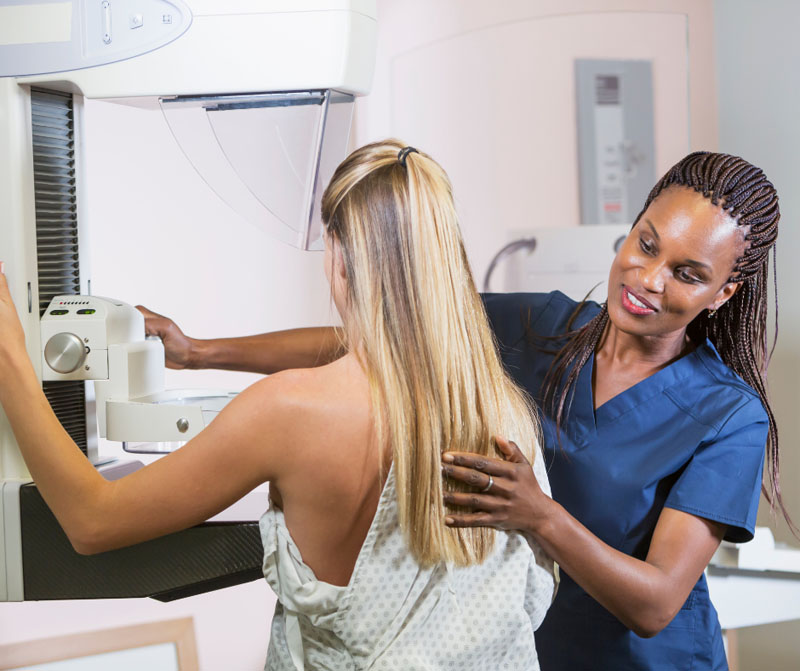How well do you know your breasts? If you perform a monthly breast self-exam, you’re probably familiar with how your breasts normally look and feel. That’s great because it can help you identify changes your primary care physician may want to investigate. There’s something else you should know about your breasts that you can’t learn by touch or sight alone: whether you have dense breast tissue.
Understanding your breast density is key to assessing your risk for breast cancer and making informed decisions about your breast health.
Why Breast Density Matters
Dense breast tissue can add a layer of complexity when it comes to evaluating and diagnosing breast cancer in women. The presence of dense tissue may make it more difficult to detect abnormalities in the breast and can be associated with an increased risk of breast cancer.
Your breast density isn’t set in stone — it can change from year to year. Approximately 40%–50% of women over 40 have dense breast tissue, according to the National Cancer Institute (NCI). Knowing more about breast density and the importance of annual mammograms in identifying these changes can help you maintain your best breast health over time and make decisions about your breast care.
What Is Dense Breast Tissue?
Breasts are made of milk glands and ducts, connective tissue, and fat, all of which make up breast density. Breast density is essentially the ratio of glandular and connective tissue to fatty tissue. You can’t measure breast density by touch. Your breast density can only be evaluated and categorized through mammography which is one of the many reasons why annual mammograms are recommended by breast cancer screening guidelines.
Radiologists measure breast density using the Breast Imaging Reporting and Data System (BI-RADS) scale, which was created by the American College of Radiology. The levels of density are rated on a letter scale. The four levels of the BI-RADS scale include:
- A: The breast is almost entirely fatty tissue. This level is found in around 10% of women.
- B: There are scattered areas of glandular and connective tissue, but most of the breast is fatty tissue. Around 40% of women have this type of tissue, which is known as scattered fibroglandular tissue.
- C: Most of the breast contains dense glandular tissue but there are some areas of fatty tissue, which is known as heterogeneously dense. About 40% of women have this level.
- D: The breast is almost entirely connective and glandular tissues with very little fatty tissue. Around 10% of women have extremely dense breast tissue.
Your breast density categorization is included in your mammogram report from the radiologist. If your BI-RADS results fall into categories C or D, you are considered to have dense breasts. With these results, your report may also include a recommendation for supplemental screening as part of your breast health plan.
Why Some Women Have Dense Breasts
While researchers aren’t clear on what causes dense breast tissue, they know some women can inherit it. Additionally, the density of your breasts can change over time. As you age or gain weight, your breasts may lose some of their density.
Certain factors can increase the chances of having a higher breast density. These factors include:
- Age. Breast density tends to decrease as you age, so you’re more likely to have dense breasts if you’re younger.
- Hormone replacement therapy. This treatment for menopause symptoms can lead to denser breast tissue by replacing the estrogen and progesterone that are lost during the transition.
- Low body weight. Low body fat levels increase the chance of having more glandular and fibrous tissue in your breasts.
- Pregnancy and breastfeeding. If you’re pregnant or breastfeeding, your body produces higher levels of the hormones estrogen and progesterone. Elevated hormone levels can increase breast density.
How Serious Is Dense Breast Tissue?
Your breast density is important information for you to know because having dense breasts is considered one of several risk factors for breast cancer, along with certain inherited genetic mutations, a family history of breast or ovarian cancer, getting older, and having a high body weight, among others.
Higher breast densities — categories C (heterogeneously dense) and D (extremely dense) — are associated with an increased risk for breast cancer compared with lower breast densities.
In addition, dense breast tissue can hide early-stage cancers, making them harder to find with a mammogram alone. Tumors and other breast abnormalities appear white on a mammogram. So do areas of dense breast tissue. Fatty tissue, on the other hand, shows up dark. Abnormalities are easier to spot amid fatty tissue, but they can be more difficult to pick out from surrounding dense tissue.
Can You Get Rid of Dense Breast Tissue?
You can’t get rid of dense breast tissue, but you can educate yourself about your breast cancer risk factors and stay up to date with your annual mammogram screenings. Breast abnormalities are more difficult to see on a screening mammogram, but 3D mammograms have been clinically proven to detect most breast cancers, and subspecialized radiologists are trained to find these subtle irregularities in imaging.
According to the National Comprehensive Cancer Network, women with an average risk for breast cancer should start annual mammogram screenings at age 40. For women who are at a higher risk for breast cancer, the NCCN recommends starting mammogram screenings sooner. If you are at high risk for breast cancer, you should talk to your physician about a screening schedule that is right for you.
Advanced 3D mammography is recommended for screening for breast cancer because it can help better characterize breast density and identify breast cancers early. 3D mammographic imaging captures “slices” of the breast, layering the images to create a 3D view that is clearer and easier for a radiologist to read.
In 2024, a new regulation began requiring mammogram reports to state whether patients’ breasts were dense or not dense and include information about the density findings. Look for this information in your next mammogram report and use it to discuss your breast cancer risk with your medical provider.
Should You Get an Ultrasound or Other Imaging if You Have Dense Breasts?
In addition to an annual 3D mammogram, women with higher breast density may benefit from supplemental screening, such as:
- Breast magnetic resonance imaging (MRI): Breast MRI uses radio waves and a powerful magnetic field to take high-definition images of breast tissue. This scan can help further characterize changes or concerns to inform the presence or absence of breast cancer.
- Breast ultrasound: This type of imaging uses sound waves to form images of the breasts. Breast ultrasound can help determine whether an abnormality seen on a mammogram is solid or filled with fluid. A solid mass is more likely to be cancerous.
Supplemental screening does not take the place of annual 3D screening. Rather, it is meant to provide an additional layer of early detection for those who may need it as part of their longer-term breast health plan. Not all people with dense breasts need a breast ultrasound or breast MRI. Your medical provider can determine whether these imaging exams make sense for you.







